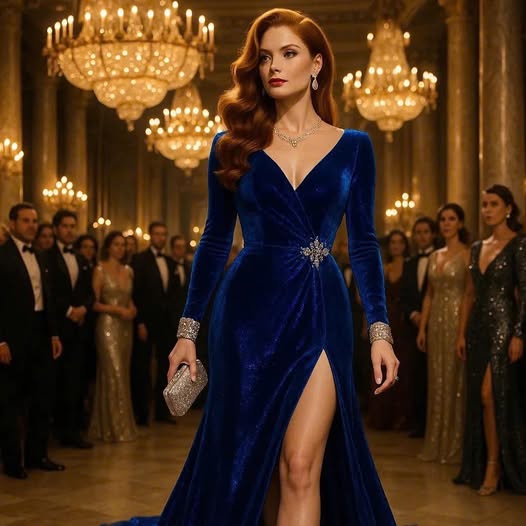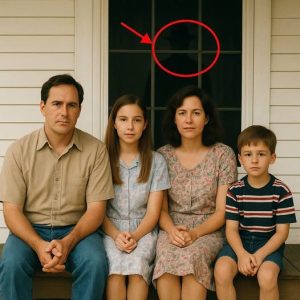My Husband Said I Was “Too Ugly” to Attend His Boss’s Wedding—So I Showed Up Alone and…
I stood in front of the hallway mirror and stared at the woman staring back. We regarded each other like strangers caught in the same elevator—silent, weary, pretending not to notice the strings of irritation pulling at our faces. My eyes looked dull and lightless, rimmed with the kind of dark circles that laughter and concealer never quite erase. Fine lines had made supple, uninvited homes at the corners of my mouth and eyes. My hair, once a reckless flag of brightness, hung limp, obedient, and tired.
Fifteen years ago, that reflection would have shown a bright-spirited girl with paint on her fingers, too many books in her bag, and fire in her heart. Today it showed me, Sarah Whitaker: someone’s wife, someone’s mother, someone who had disappeared into the background of her own life.
Brian barreled down the hallway, already half-dressed for the evening. He caught my eye in the mirror with the reflexive, impatient glance of a man checking for lint. His gaze traveled from my ankles to the crown of my head and back again, and I saw it: a look I hadn’t seen since our early years together—except that the wanting had been replaced by contempt.
“You can’t seriously think you’re going to the wedding like that,” he scoffed, tugging at a cuff link. Then, without looking at me, “No, scratch that. You’re not going at all.”
I blinked. “What?”
“You heard me. My boss’s wedding is not a backyard barbecue. It’s a high-end, elite event. Everyone will be bringing women who look like they belong on magazine covers. Tall, glamorous, elegant. You…” He hesitated there, as if searching for the precise cruelty. He found it. “You look like a plain gray mouse.”
I flinched. I don’t know if it was the words themselves or the ease with which he threw them at me that hurt more—like this insult had been kept nearby, ready for use. My throat closed around a dozen rebuttals that had lived there for years and failed to become speech.
“I mean, honestly, look at yourself,” he added. “You’ll only embarrass me. I can’t bring that into a room full of CEOs, models, and celebrities. You drag me down.”
He disappeared into his office and slammed the door the way you slam punctuation onto a page when you don’t trust your argument to hold.
I lowered myself onto the edge of the couch and let the tears out. Not the cinematic kind—no shoulder-shaking sobs, no tissues pulled out with dramatic flourish. Quiet streaks. The tears of a woman ashamed not because of what he said, but because a part of her had started believing it was true.
That night, after he left for a networking dinner, I sat alone and held the truth like a stone in my chest: somewhere along the way, I had let myself become invisible. Invisible to him, and worse— invisible to me.
Morning arrived with the heavy-footed routine it always brought. I made breakfast, packed lunches, reminded the kids to find their shoes under the couch instead of wailing that they’d been stolen by gremlins. Brian sat at the table scrolling his phone, the words from the night before stored neatly away in a cabinet labeled Not to Be Discussed. I tried twice to open that cabinet, and twice he shut it with a snort, a look, a slice of silence.
“You’re not going,” he said finally one evening, eyes on his laptop. “Stop bringing it up. I already told them you’re sick. That’s that.

That night, after the kids had gone to bed, I sat cross-legged on the living room rug with a stack of laundry at my side. I folded a shirt, then another, and then stopped, hands motionless on a pair of jeans. A thought cut through the fog with such clarity it startled me: What if I went anyway?
The idea was absurd. Childish. Dangerous, even. But once it lodged itself in my mind, it refused to leave.
I imagined myself slipping quietly into the venue, a ghost at the edge of chandeliers and champagne. Maybe Brian wouldn’t notice me until it was too late, until I was already standing there, undeniable. A part of me longed to see the look on his face—shock, anger, perhaps even fear—when he realized the woman he’d dismissed was not content to stay hidden.
The next morning, while he rattled on about seating charts and business opportunities, I booked an appointment at a small salon I hadn’t visited in years. My heart pounded as I clicked “confirm,” the way it used to when I signed up for art classes or road trips in my twenties, back when I still believed in myself.
The woman at the salon studied me in the mirror. “It’s been a while, huh?” she said gently, lifting a section of my hair.
“Fifteen years,” I confessed.
“Well,” she said with a grin, “let’s bring you back, then.”
Hours later, I hardly recognized the woman staring back at me. The limp strands were gone, replaced with a cut that framed my face with intention. My skin glowed faintly from care, not neglect. I wasn’t glamorous—not like the women Brian idolized—but I was vivid again. Present.
On the evening of the wedding, I stood in front of my closet. Sequins and silk were foreign languages to me, so I reached for the one dress that had survived every purge: a deep green wrap dress I’d once worn on a date with Brian, back when he still looked at me like I was light itself. It hugged me differently now, but it still whispered the same truth: you are allowed to take up space.
I called a cab. My hands shook all the way to the hotel, but my chest hummed with something stronger than fear—something that felt almost like joy.
The ballroom glittered when I entered, chandeliers scattering light across marble floors. The air was thick with perfume and laughter, but conversations stuttered when I walked by. Not because I was the most stunning woman there, but because I looked like I belonged—and I knew it.
Then I saw him. Brian, laughing too loudly at a cluster of executives, a glass of champagne raised high. His smile faltered the moment our eyes met.
I didn’t rush toward him. I didn’t shrink back, either. I simply walked, steady and deliberate, the way a woman walks when she finally remembers she has the right to be seen.





